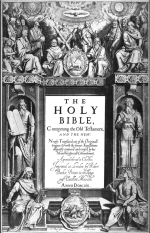The writer of the article said this:
There is absolutely no evidence that the Bible has been revised, edited, or tampered with in any systematic manner.
I assume the writer is suggesting that all versions, including the KJV, are faithful, unaltered, unedited, or accurate translations of God's Word.
Well you know what they say about assuming things, because that's not what he said or is suggesting at all.
However, the writer also said this:
Of course, inerrancy can only be applied to the original manuscripts, not to the copies of the manuscripts.
From that statement, I assume the writer also believes that the Bibles we have today are not inerrant.
It's not just a belief, marke. It's reality. NOT ONE of the Bibles in existence today are inerrant. That would imply perfection where humans are involved, and no human is perfect, let alone however many hundreds over the years who transcribed and copied the Bible. Someone is bound to make an error here or there.
I do not share the writer's low opinion of God's word in the hands of God's people today.
The one with the low opinion of God's word here is you, marke, which makes you wrong!
You think God is incapable of writing a book that can survive being modified in any way at all! You're like the calvinists who believe that if God changes in any way, He'll break, but instead of it being God, it's His Word!
The fact of the matter is that it's been copied, it's been transcribed, it's been translated. It's been copied some more! Those are all changes! And yet, it's still consistent enough that we know it's His word!
Again I point out, as Will Duffy did, that the very fact that all of the texts agree as much as they do, to within 1-2% of each other, should be cause to REJOICE that God is capable of writing a book that, even with minor errors, has withstood the test of time, and that the consistency even with errors is evidence of it's reliability as God's word!
They are consistent enough that we can chalk the vast majority of inconsistencies up to copy errors!
God has indeed preserved His word, just not in the way you want Him to have.
The fact remains whether you think it is a matter of unsupported opinion or not, people either hold the KJV Bible as special to them or not, and choices like that cannot be dismissed as wrong.
Sure they can.
Not everyone who examines old manuscripts knows how to distinguish between the good and the bad.
And you think you do?
I'm simply trying to get you to provide (which you STILL have not done) an example of Greek texts that contradict each other in some meaningful way.
You keep offering examples that DO NOT contradict each other in a meaningful way, because those examples do not affect the overarching plot of the Bible, only minor details. In other words, THEY DON'T CHANGE THE STORY!
I do appreciate the fact the KJV translators were faithful to italicize the words they added for our benefit and encouragement.
They didn't italicize the headings you hold so dear.
And you criticize the NKJV for adding a word or two and not making mention of it.
Hypocrite!
I'm sure the NKJV translators added their marginal notes for noble reasons as well.
Why wouldn't they?
It's an honest thing to do.
I believe the Sinaiticus was a forgery written for profit and passed upon the world in a scam by men motivated by fame and profit.
You have a lot of opinions, but not many, as Rhema said, informed ones.
There are many eyewitness accounts from that period that support that belief.
More elephant hurling.




